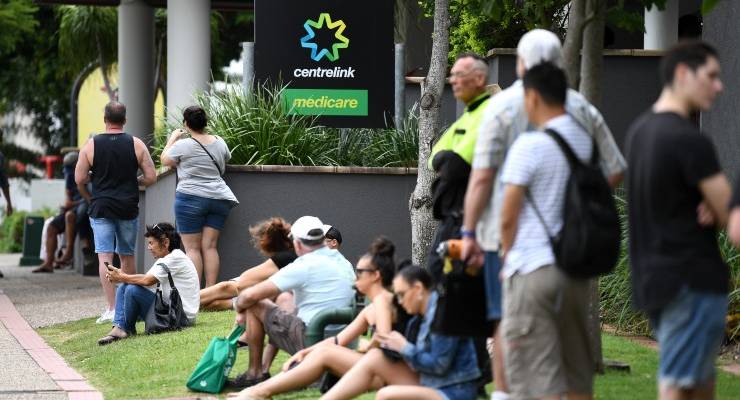
As Victoria is discovering, and the rest of us may yet discover, COVID-19 is perfectly habituated to a 21st century economy centred around services delivered by outsourced, precarious workforces.
Daniel Andrews, whatever his faults, at least recognises the role of insecure work in driving people to continue going to work even if they’re feeling ill, enabling the transmission of the virus. And many of those jobs are in service industries, which exposes more people to potential infection.
The acceleration in infection is thus a US-style outcome to a US-style feature of our economy — that despite Medicare, and a better industrial relations system, workers are still faced with an invidious choice of working while ill or losing income.
The current $1500 payment for casual workers if they become infected is little help for people deciding to lose a few days’ shifts for the good of the community.
It’s not a choice many people on higher incomes face. And the government is giving federal politicians time off work rather than requiring them to attend parliament, without any loss of income. High-profile journalists, enjoying incomes multiples of those of people in insecure work, scold lower-income people for their irresponsibility.
But many are doing exactly what our economy requires them to do. Australia was once the land — so we told ourselves — of worker self-indulgence, a national that honoured the great tradition of chucking a sickie, of putting the feet up rather than doing the hard yakka (funnily enough, that was also when our labour productivity was significantly higher than now, but anyway).
Since the 1990s — when the level of casualisation in the workforce dramatically increased, though it has stayed relatively level since then — that’s changed fundamentally.
The rapidly expanding personal service economy enabled by the internet has accelerated that in recent years, creating terms like “gig economy” and “side hustle” to describe what has replaced full-time, secure work. And the war in penalty rates conducted by business and the Coalition has only increased pressure on the incomes of people in casual work.
And these are jobs that the worried well of the middle class — including well-paid journalists — expect as part of the modern economy. The barista to make a coffee whenever you want; the driver to deliver your food and transport you across town at your command; the petsitter to look after your animals; the cleaner you need at home because you and your partner are too busy. All jobs where if you miss a shift, you don’t get paid.
That’s a related but quite separate matter to the growth of labour hire and outsourcing, by both governments and the private sector, of what used to be specialist roles but now appears to be pretty much anything, including security guards.
Labour hire, a sector rife with exploitation and wage theft, offers not merely a lower-cost form of labour than bothering to employ someone, but it also outsources responsibility for any problems.
Workers not paid enough? It’s the fault of the labour hire firm. Workers not qualified, untrained or inexperienced? It’s the fault of the labour hire firm. Firms that, conveniently, tend to disappear as rapidly as they appear when subjected to scrutiny — as the “judicial” inquiry into the quarantine debacle in Victoria will likely find.
Labour hire is popular not merely because it saves money, but it enables firms, and governments, to shift blame and avoid the legal and reputational repercussions that flow from stuff-ups.
“Not our fault,” the minister/executive can say; concerned, of course, but not accountable. “You’ll have to raise that issue with the company responsible.”
That many workers operating in outsourced or insecure jobs go home to poor quality, overcrowded public housing, of course, simply redoubles the opportunity for infection.
Victoria has badly underinvested in public housing in recent years, preferring budget surpluses to maintaining the strong level of investment that was a feature of the Liberals’ years in power there. That featured little in many mainstream media accounts — often featuring implied and sometimes open racism and classism — of the lockdown of public housing towers.
For millennia, viruses and bacteria have cleverly adapted to and thrived in human structures — the settled communities that followed agriculture, the towns and cities that created employment, economies of scale and innovation, the networks that connected them together.
Human economic activity provides the infrastructure for infection, and our latest innovations of outsourcing, insecure work and leaving housing to the marketplace have provided a perfect environment for COVID-19 to resist our attempts to eradicate it. It’s a viral world; we just deregulate in it.








So what do we do about it?
BK, your link to the Liberal years in power in Vic also takes the interested reader to the comments about your obvious pro-Lib anti-Lab bias views then that are still valid today.
Have a chat to Grundle if you can bring yourself acknowledge some criticism, he is more on the money than you are when it comes to Andrew’s performance.
Good article – notwithstanding the obligatory anti Labor jibe (which may, this case, actually have some legs).
This is an excellent article.
The virus I hate more than ever is the conservative greedite one. They have aimed at establishing a controlled world of coerced, cowed, supine unfortunates who get robbed, cheated, short changed, and are left unhappy, vulnerable with poorer wages, conditions and a sense of insecurity, which incubates unrest, counter behaviour, desperation, disease, unsatisfactory participation in society and the economy. The perpetrators are well off and can command while staying out and above, except that a crisis like this virus one can get anyone, as did bombs in war. War tended to bring societies together as sacrifices and risks were basically shared. Can we behave better, think ahead, plan a recovery? I have no faith in the likely efforts of the Solly Lew, C Palmer, G Harvey, G Rinehart types to make anything better, except to reinforce cunning, selfishness, egofixation, profiteering.